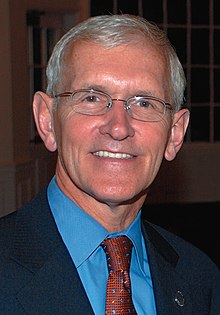Steven Craig Gunderson (born May 10, 1951) is an American former politician who was a Republican U.S. Representative for Wisconsin's 3rd congressional district from 1981 to 1997, when he was succeeded by Democrat Ron Kind. After leaving office, he was president and CEO of the Council on Foundations,[3] and then of Career Education Colleges and Universities.[4]
Steve Gunderson | |
|---|---|
 Gunderson in Sept. 2011 | |
| House Republican Chief Deputy Whip | |
| In office January 3, 1989 – January 3, 1993 Serving with Robert Smith Walker | |
| Leader | Robert H. Michel |
| Preceded by | Edward Rell Madigan |
| Succeeded by | Robert Smith Walker |
| Member of the U.S. House of Representatives from Wisconsin's 3rd district | |
| In office January 3, 1981 – January 3, 1997 | |
| Preceded by | Alvin Baldus |
| Succeeded by | Ron Kind |
| Member of the Wisconsin State Assembly from the 91st district | |
| In office January 6, 1975 – July 9, 1979 | |
| Preceded by | Eugene Oberle[1] |
| Succeeded by | Alan S. Robertson[2] |
| Personal details | |
| Born | May 10, 1951 Eau Claire, Wisconsin, U.S. |
| Political party | Republican |
| Spouse |
Ethan Ngo (m. 2015) |
| Education | University of Wisconsin, Madison (BA) Brown College |
Early years
editGunderson grew up near Whitehall, Wisconsin. After studying at the University of Wisconsin–Madison, he went on to train at the Brown School of Broadcasting in Minneapolis.
Political career
editGunderson served in the Wisconsin State Assembly from 1975 to 1979 before being elected to the U.S. House of Representatives in 1980, to represent Wisconsin's 3rd congressional district. First elected to the 97th Congress, he served eight terms in the House and did not seek re-election to the 105th Congress in 1996.[5] He was appointed by President Barack Obama to the President's Commission on White House Fellows in January 2010.[6]
Gunderson advocated for expedited immigration rights to the Hmong people, who had been allied with U.S. war efforts during the Vietnam War and later faced persecution under the Communist government of Laos. In an October 1995 National Review article, Michael Johns, a former Republican White House aide and Heritage Foundation policy analyst, praised Gunderson's efforts in behalf of the Hmong people, quoting Gunderson as telling a Hmong gathering in Wisconsin: "I do not enjoy standing up and saying to my government that you are not telling the truth, but if that is necessary to defend truth and justice, I will do that."[7] Republicans also called several congressional hearings on alleged persecution of the Hmong in Laos in an apparent attempt to generate further support for their opposition to the Hmong's repatriation to Laos. Led by Gunderson and other Hmong advocates in Congress, the Clinton administration's policy of forced repatriation of the Hmong was ultimately overturned and thousands were granted U.S. immigration rights.
Personal life
editOn March 24, 1994, Gunderson was outed as gay on the House floor by representative Bob Dornan (R-CA) during a debate over federal funding for gay-friendly curriculum,[8] making him one of the first openly gay members of Congress and the first openly gay Republican representative.[9] In 1996, Gunderson was the only Republican in Congress to vote against the Defense of Marriage Act,[10][11] and he has been a vocal supporter of gay rights causes since leaving Congress. During his time in the House, Gunderson was one of only two openly gay Republicans serving in Congress, the other being Jim Kolbe of Arizona.[12]
Published works
edit- House and Home, E. P. Dutton, 1996, ISBN 978-0-525-94197-2 (with Rob Morris and Bruce Bawer)
See also
editReferences
edit- ^ "Our Campaigns - WI State Assembly 91 Race - Nov 05, 1974".
- ^ "Our Campaigns - WI State Assembly 91 Race - Nov 07, 1978".
- ^ "Steven Gunderson, President & CEO". Council on Foundations. Archived from the original on February 3, 2010. Retrieved August 27, 2009.
- ^ "Bio; Steve Gunderson, President and CEO". January 3, 2018. Archived from the original on June 8, 2020. Retrieved January 3, 2018.
- ^ "Gunderson, Steven 1951". www.wisconsinhistory.org. Archived from the original on June 11, 2011. Retrieved January 17, 2022.
- ^ "President Obama Announces More Key Administration Posts, 1/19/10". whitehouse.gov. January 19, 2010. Archived from the original on February 16, 2017. Retrieved November 22, 2010 – via National Archives.
- ^ Johns, Michael (October 23, 1995). "Acts of betrayal – persecution of Hmong". National Review. Archived from the original on April 29, 2008. Retrieved June 2, 2008.
- ^ Chris Bull (May 3, 1994), The Out House: Congressional Debate over an Education Bill Gets Personal and Nasty, The Advocate, p. 29.
- ^ Bergling, Tim (May 11, 2004). "Closeted in the capital: they're powerful, Republican, and gay. Will the marriage battle finally get them to come out to their bosses?". The Advocate. Retrieved August 27, 2009.
- ^ "Final Vote Results for Roll Call 316". Clerk of the United States House of Representatives. July 12, 1996.
- ^ "U.S. Senate Roll Call Votes 104th Congress - 2nd Session: On Passage of the Bill (H.R.3396 )". United States Senate. September 10, 1996.
- ^ Mendelberg, Tali (2001). The Race Card: Campaign Strategy, Implicit Messages, and the Norm of Equality. Princeton, NJ: Princeton University Press. ISBN 0691070717. Retrieved March 23, 2018.
External links
edit- United States Congress. "Steve Gunderson (id: G000524)". Biographical Directory of the United States Congress.
- Appearances on C-SPAN
- HRC:Steven Gunderson Archived February 7, 2012, at the Wayback Machine